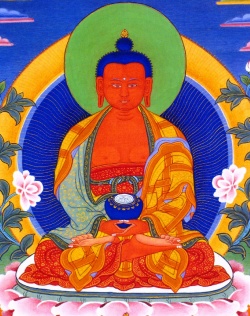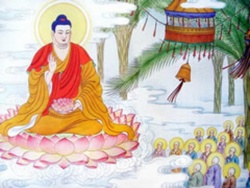Difference between revisions of "The Amitabha Root Dharani"
(Created page with "thumb|250px| <poem> The Amida Nyorai Konpon Darani (阿弥陀如来根本陀羅尼) or “Amitabha Buddha Root Dharani” is a dharani used in some Japanese B...") |
|||
| Line 1: | Line 1: | ||
[[File:937.jpg|thumb|250px|]] | [[File:937.jpg|thumb|250px|]] | ||
<poem> | <poem> | ||
| − | The Amida Nyorai Konpon Darani (阿弥陀如来根本陀羅尼) or | + | The [[Amida]] Nyorai Konpon Darani (阿弥陀如来根本陀羅尼) or “[[Amitabha Buddha]] Root [[Dharani]]” is a [[Dharani]] used in some Japanese Buddhist sects, typically only for the [[Segaki]] [[Ritual]] used to feed the [[Hungry ghosts]] in [[BUDDHISM]], or possibly [[Funerals]] and other similar services. It is typically only found in [[Esoteric]] [[Rituals]] in [[Shingon]] and [[Tendai]] [[BUDDHISM]], but can be found in [[Jodo]] Shu and [[Zen]] as well. The [[Dharani]] is typically of very, very limited use, and not part of normal liturgy. |
| − | This page is intended to post the | + | This page is intended to post the [[Dharani]] for reference purposes only. [[Esoteric]] practices such as [[Mantras]] and [[Dharani]] should only be used as recommended by one’s [[Teacher]], under a guided training program. I found reference material on this [[Dharani]] to be almost non-existent in English, hence my decision to post it here. This page also provides a good overview of what a [[Dharani]] is in [[BUDDHISM]]. |
| − | This page will provide both the Sino-Japanese reading follow by the Sanskrit reading. There are multiple versions of the | + | This page will provide both the Sino-Japanese reading follow by the [[Sanskrit]] reading. There are multiple versions of the [[Dharani]] in Japanese, so pronunciation may vary slightly between them, so for this reason the [[Sanskrit]] is provided as well. No translation will be provided as this is part of the [[Esoteric]] training one should undergo when learning the [[Dharani]]. Any translation you see online of this, or any [[Mantra]]/[[Dharani]], should be treated as suspect. |
Can’t read the characters? | Can’t read the characters? | ||
| Line 18: | Line 18: | ||
Disclaimer and Legal Info | Disclaimer and Legal Info | ||
| − | I hereby release this into the public domain. Please use it as you see fit, but if you attribute it to this site, greatly appreciated. Also, please bear in | + | I hereby release this into the public domain. Please use it as you see fit, but if you attribute it to this site, greatly appreciated. Also, please bear in [[MIND]] this is an amateur work, and should not be taken too seriously. |
| − | Dedication | + | [[Dedication]] |
| − | I dedicate this effort to all | + | I dedicate this effort to all [[Sentient beings]] everywhere. May all beings be well, and may they all attain perfect [[Peace]]. |
| − | Namu Amida Butsu | + | [[Namu Amida Butsu]] |
| − | The Amitabha Root Dharani | + | The [[Amitabha]] Root [[Dharani]] |
Japanese Kana | Japanese Kana | ||
| Line 50: | Line 50: | ||
saraba kyarama kireisha kyashayō kyarei sowaka | saraba kyarama kireisha kyashayō kyarei sowaka | ||
| − | Romanized Sanskrit | + | Romanized [[Sanskrit]] |
| − | Namo ratna-trayāya | + | [[Namo]] ratna-trayāya |
namaḥ āryāmitābhāya tathāgatāyārhate | namaḥ āryāmitābhāya tathāgatāyārhate | ||
samyak-saṃbuddhāya. | samyak-saṃbuddhāya. | ||
| Line 59: | Line 59: | ||
amṛta-vikrānta-gāmine amṛta-gagana kīrtikare | amṛta-vikrānta-gāmine amṛta-gagana kīrtikare | ||
amṛta-dundubhi-svare sarvārtha sādhane | amṛta-dundubhi-svare sarvārtha sādhane | ||
| − | sarva- | + | sarva-[[Karma]]-[[Kleśa]]-kṣayaṃ-kare svāhā! |
</poem> | </poem> | ||
{{R}} | {{R}} | ||
Revision as of 16:27, 4 June 2013
The Amida Nyorai Konpon Darani (阿弥陀如来根本陀羅尼) or “Amitabha Buddha Root Dharani” is a Dharani used in some Japanese Buddhist sects, typically only for the Segaki Ritual used to feed the Hungry ghosts in BUDDHISM, or possibly Funerals and other similar services. It is typically only found in Esoteric Rituals in Shingon and Tendai BUDDHISM, but can be found in Jodo Shu and Zen as well. The Dharani is typically of very, very limited use, and not part of normal liturgy.
This page is intended to post the Dharani for reference purposes only. Esoteric practices such as Mantras and Dharani should only be used as recommended by one’s Teacher, under a guided training program. I found reference material on this Dharani to be almost non-existent in English, hence my decision to post it here. This page also provides a good overview of what a Dharani is in BUDDHISM.
This page will provide both the Sino-Japanese reading follow by the Sanskrit reading. There are multiple versions of the Dharani in Japanese, so pronunciation may vary slightly between them, so for this reason the Sanskrit is provided as well. No translation will be provided as this is part of the Esoteric training one should undergo when learning the Dharani. Any translation you see online of this, or any Mantra/Dharani, should be treated as suspect.
Can’t read the characters?
If you’re having trouble reading the Kanji characters, you might have one or two problems with your computer:
Your computer may not have Asian fonts installed. In Windows you have to enable UTF8 and East Asian fonts under the Control Panel. Modern Mac computers are fully compatible already.
Your browser may be assuming the wrong character set. If you use a relatively modern browser and use UTF8 as character set, you should be able to read fine. IE, Firefox and Safari all read this fine as far as I can tell.
Even if not, then you can still use the romanized characters.
Disclaimer and Legal Info
I hereby release this into the public domain. Please use it as you see fit, but if you attribute it to this site, greatly appreciated. Also, please bear in MIND this is an amateur work, and should not be taken too seriously.
Dedication
I dedicate this effort to all Sentient beings everywhere. May all beings be well, and may they all attain perfect Peace.
Namu Amida Butsu
The Amitabha Root Dharani
Japanese Kana
ノウボウ アラタンノウ タラヤ-ヤ-
ノウマク アリヤ-ミタバ-ヤ- タタギャ タヤ-
アラカテイ サンミャクサンボダヤ-
タニャタ オン アミリテイ アミリトドバンベイ アミリタサンバンベイ
アミリタギャラベイ アミリタシッデイ アミリタテイゼイ アミリタビキランテイ
アミリタビキランタ ギャミネイ アミリタギャギャノウ キチキャレイ
アミリタドンドビソバレイ サラバアラタ サダネイ
サラバキャラマキレイシャ キャシャヨウキャレイソワカ
Japanese Romaji
nōbō aratannō tarayāyā
nōmaku ariyāmitabāyā tatagyatayā
arakatei sanmyakusanbodayā
tanyata on amiritei amiritodobanbei amiritasanbanbei
amiritagyarabei amiritashiddei amiritateizei amiritabikirantei
amirita bikiranta gyaminei amirita gyagyasō kichikyarei
amirita dondobi sobarei sarabārata sadanei
saraba kyarama kireisha kyashayō kyarei sowaka
Romanized Sanskrit
Namo ratna-trayāya
namaḥ āryāmitābhāya tathāgatāyārhate
samyak-saṃbuddhāya.
Tadyathā oṃ amṛte amṛtodbhave amṛta-saṃbhave
amṛta-garbhe amṛta-siddhe amṛta-teje amṛta-vikrānte
amṛta-vikrānta-gāmine amṛta-gagana kīrtikare
amṛta-dundubhi-svare sarvārtha sādhane
sarva-Karma-Kleśa-kṣayaṃ-kare svāhā!


